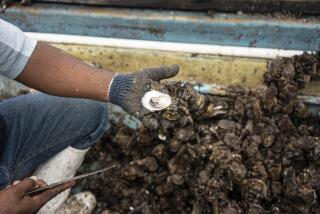Salmonella Cases in Southeast on the Rise
- Share via
ATLANTA — Outbreaks of a potentially fatal form of salmonella linked to consumption of raw and undercooked eggs are on the rise in the Southeast, an increase that has puzzled federal health officials, who called Thursday for expanded efforts to prevent the spread of the bacteria.
In a study published in its weekly morbidity and mortality report, the federal Centers for Disease Control and Prevention in Atlanta said salmonella enteritidis infections jumped 50% in Southeastern states in 2001, compared to the previous year.
Those infected with the bacteria typically have fever, abdominal cramps and diarrhea for as long as a week. But the elderly, infants and those with weak immune systems can develop fatal infections if not treated promptly.
The CDC said it was not clear why the salmonella bug was becoming more common in a region extending from Delaware to Florida. It noted that other parts of the nation had reported stable or declining infection rates.
The number of infections in the country overall has fallen by about 50% since peaking in 1995 at 3.8 per 100,000 people.
“I don’t think it’s necessarily something that the Southeast is not doing that the other places are doing,” said Dr. Padmini Srikantiah of the CDC’s National Center for Infectious Diseases.
“The nature of these sorts of epidemics is that we may see increases in certain areas and decreases in others at different times,” said Srikantiah, who nevertheless noted that efforts to monitor and prevent the bacteria needed to be strengthened.
The CDC study found that a disproportionate number of the salmonella infections and deaths in the nation occurred among people living in institutions, such as nursing homes, assisted living facilities and prisons.
Twelve percent of the 677 salmonella enteritidis outbreaks and 22 of the 33 deaths linked to the bacteria from 1990 to 2001 occurred in institutional settings, according to the study.
The largest of the outbreaks in 2001 occurred in South Carolina, where hundreds of inmates in four prisons complained of problems after eating tuna salad containing eggs. Investigators found that eggs used in the prisons came from a farm later found to be producing eggs infected with salmonella enteritidis bacteria.
The CDC said it was important that producers refrigerate eggs during storage and transportation and that retailers and consumers buy eggs from farms with salmonella control programs recognized by a state agency or poultry association.
The agency advised that eggs should not be eaten unless they were pasteurized and cooked until the whites and yolks were firm.
More to Read
Sign up for Essential California
The most important California stories and recommendations in your inbox every morning.
You may occasionally receive promotional content from the Los Angeles Times.










